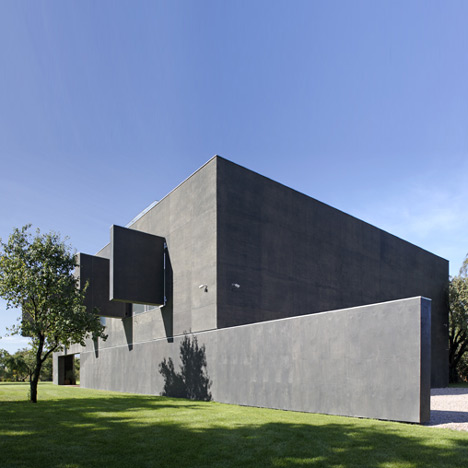This house outside Warsaw by Polish architect Robert Konieczny transforms from a villa by day to a fortress by night.
Called Safe House, the residence shuts down to a safe central core with a drawbridge, a shutter that drops down to cover an entire facade and massive wall panels that block out all the windows.
The thick courtyard walls slide back into the house.
The drawbridge leads to the roof of an adjacent building that houses a swimming pool.
Photography is by Aleksander Rutkowski.
More stories about projects in Poland on Dezeen »
Here is some more information from Robert Konieczny:
Safe House
Location
The house is situated in a small village at the outskirts of Warsaw. The surroundings are dominated with usual "polish cubes” from the sixties and old wooden barns.
Idea
The clients' top priority was to gain the feeling of maximum security in their future house, which determined the building's outlook and performance. The house took the form of a cuboid in which parts of the exterior walls are movable.
When the house opens up to the garden, eastern and western side walls move towards the exterior fence creating a courtyard.
After crossing the gate one has to wait in this safety zone before being let inside the house. In the same time, there is no risk of children escaping to the street area in an uncontrolled way while playing in the garden.
Movable elements interfering with the site layout
The innovation of this idea consists in the interference of the movable walls with the urban structure of the plot. Consequently, when the house is closed (at night for example) the safe zone is limited to the house's outline.
In the daytime, as a result of the walls opening, it extends to the garden surrounding the house.
New type of building
The sliding walls are not dependent on the form of the building.
That is why this patent can be applied to both modern and traditional, single- and multi - storeyed houses covered with roofs of different geometry.
This universal solution we came up with gives a new type of building where not the form but the way of functioning is the most important. The name: "safe house” gains a new meaning now.
Mechanic...
Accomplishment of this idea required the use of technically complex solutions.
The most significant are the sliding walls (both 2,2 m high, 22 and 15 m long), which allow to interfere with the urban structure and determine the safe zone of the plot.
They are not the only mobile elements of the building.
Apart from these, there are large shutters (all 2,8 m high, with a width ranging up to 3,5 m, opening up to 180 degrees) and a drawbridge leading to the roof terrace above the swimming pool.
The southern elevation is closed by an enormous roll-down gate of 14 and 6 m manufactured by a company normally supplying shipyards and air companies.
It is made with white anodized aluminum which makes it possible to function as a movie projection screen.
All the movable elements are based on built-in electronic engines, that guarantee safe operation.
The whole building is a concrete monolith, while it's mobile parts – for the sake of considerable size – are light steel trusses filled with mineral wool.
As a result, the building is perfectly insulated when closed.
The whole house as well as the mobile elements are clad with cement-bonded particleboards - Cetris and waterproof alder plywood fixed to a steel construction and painted with dark wood stain, which resembles the wood widely found on the surrounding houses and barns, and makes it fit well into the rural landscape.
Click above for larger image
... to Organic
Once the house opens, it's bright and spacious interior merges extensively with the garden.
Click above for larger image
Wide glazings behind the movable walls let the building acquire energy during the day (winter) or prevent the sun's heat from going into the house (summer).
Click above for larger image
At night, when the house is closed, the thick outer layer helps the building to accumulate the gained energy.
Click above for larger image
Such a solution together with the hybrid heat system (most of the energy is gained from renewable sources – heat pump and solar systems supported with gas heating) and mechanical ventilation with heat recovery makes the house become an intelligent passive building.
Click above for larger image
Every day the house acts in a similar way – it wakes up every morning to close up after the dusk. This routine reminds of the processes occurring in nature – the house resembles a plant in its day and night cycle.
Click above for larger image
architect: Robert Konieczny
collaboration: Marcin Jojko, Łukasz Zadrzyński
interior design: Magdalena Radałowicz-Zadrzyńska
site area: 2500 m2
usable floor area: 567m2
volume: 1719m3
design: 2004-2005
construction: 2005-2009
Click above for larger image

